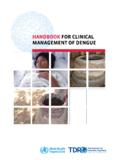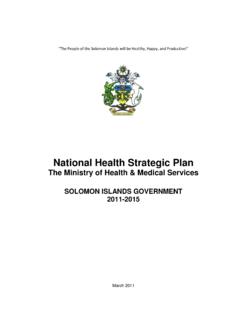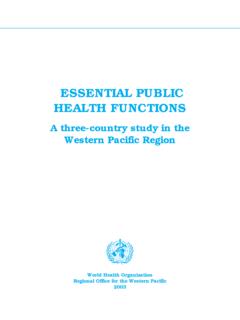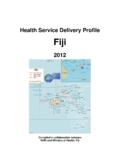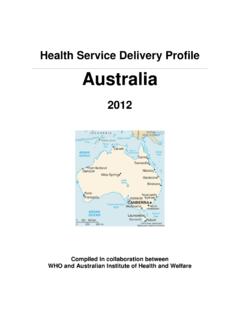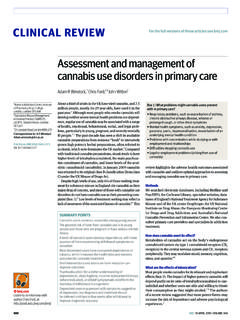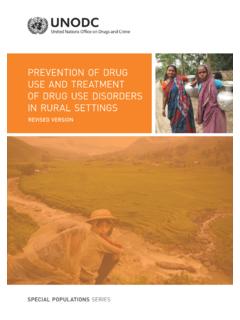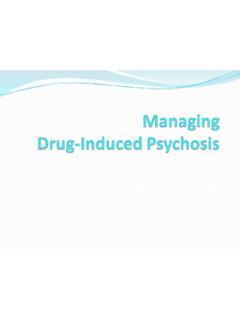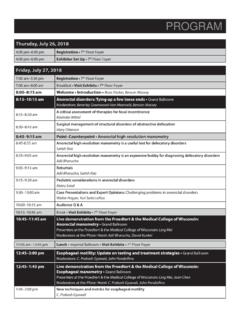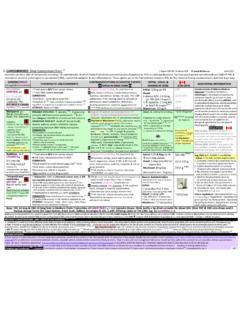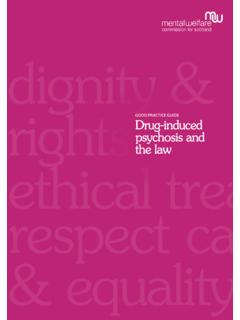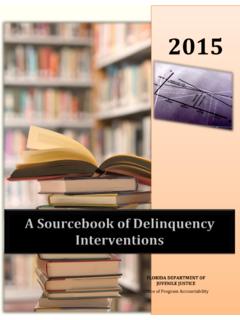Transcription of WHO Library Cataloguing in Publication Data - WPRO
1 IiWHO Library Cataloguing in Publication DataClinical guidelines for withdrawal management and treatment of drug dependence in closed settings. 1. Substance-related disorders rehabilitation. 2. Opiod-related disorders rehabilitation. 3. Alcoholism rehabilitation. Marijuan abuse rehabilitation. 5. Substance abuse treatment centers. 6. Prisons. 7. Work camps. 8. HIV infections prevention and control. 9. HIV infections transmission. 10. Practice guideline. I. World Health Organization. Regional Offi ce for the Western Pacifi c. ISBN 978 92 9061 430 2 (NLM Classifi cation:WM 270) World Health Organization 2009 All rights reserved.
2 The designations employed and the presentation of the material in this Publication do not imply the expression of any opinion whatsoever on the part of the World Health Organization concerning the legal status of any country, territory, city or area or of its authorities, or concerning the delimitation of its frontiers or boundaries. Dotted lines on maps represent approximate border lines for which there may not yet be full mention of specifi c companies or of certain manufacturers products does not imply that they are endorsed or recommended by the World Health Organization in preference to others of a similar nature that are not mentioned.
3 Errors and omissions excepted, the names of proprietary products are distinguished by initial capital World Health Organization does not warrant that the information contained in this Publication is complete and correct and shall not be liable for any damages incurred as a result of its of the World Health Organization can be obtained from WHO Press, World Health Organization, 20 Avenue Appia, 1211 Geneva 27, Switzerland (tel: +41 22 791 2476; fax: +41 22 791 4857; e-mail: Requests for permission to reproduce WHO publications, in part or in whole, or to translate them whether for sale or for noncommercial distribution should be addressed to WHO Press, at the above address (fax: +41 22 791 4806.))
4 E-mail: For WHO Western Pacifi c Regional Publications, request for permission to reproduce should be addressed to Publications Offi ce, World Health Organization, Regional Offi ce for the Western Pacifi c, Box 2932, 1000, Manila, Philippines, fax: +632 521 1036, e-mail: guidelines for withdrawal managementand treatment of drug dependence inclosed settingsRecommendations to closed settings in the Western Pacifi c RegionIt is anticipated that the recommendations in this document will remain valid until 2014. The HIV/AIDS and STI Focus, Division of Combating Communicable Diseases, at WHO Western Pacifi cRegional Offi ce will be responsible for initiating a review of these recommendations at that people have contributed to the development of this World Health Organization (WHO), Regional Offi ce for the Western Pacifi c, wishes to thank Ms Sarah Larney, Dr Bradley Mathers and Associate Professor Kate Dolan for drafting the clinical guidelines for withdrawal management and treatment of drug dependence in closed settings.
5 Expert review of the draft was provided by Dr Alex Wodak and Dr Linda Gowing. Field-testing of the guidelines was conducted by Dr Deborah Zador and Ms Sarah Larney. The fi nal draft was prepared by Ms Sarah would particularly like to acknowledge Dr Dominique Ricard and Mr Graham Shaw fortheir contribution in the fi eld-testing of the guidelines conducted in Cambodia and in the Lao People s Democratic Republic. WHO also acknowledges Dr Fabio Mesquita, Mr Gray Sattler and Ms Manuela Moeller for their assistance in preparing the of interestsConfl ict of interest statements were collected from all of the above major contributors.
6 No confl ict of interest has been declared by any contributors to the were the recommendations developed, reviewed, revised and fi nalized?In 2005, the WHO Regional Offi ce for the Western Pacifi c identifi ed the lack of a clear direction on drug treatment in closed settings, a major problem in South East Asia. In agreement with the National Drug and Alcohol Research Centre of the University of South Wales, in Australia, WPRO requested the production of a evidence-based Clinical guidelines for withdrawal management and treatment of drug dependence in closed settings . Ms Sarah Larney, Dr Bradley Mathers and Associate Professor Kate Dolan from the National Drug and Alcohol Research Centre of the University of South Wales were requested to present a draft of the guidelines.
7 Additional to their research and clinical experiences, search and evidence from the literature was conducted by the authors using PUBMED, the University of South Wales database, the WHO Library database and regional databases. Particular efforts were made to identify systematic literature reviews and evidence related specifi cally to drug treatment in closed settings in developing countries, particularly from South-East on the draft was submitted for review to researchers and clinicians with a strong experience and reputation in the fi eld of drug treatment: Dr Alex Wodak and Dr Linda Gowing.
8 The Harm Reduction Technical Offi cers of WPRO also made comments and directed the development according to the needs of the Member States. Comments were received and the draft amended as necessary. The amended guidelines were fi nally fi eld tested in October of 2008 in Cambodia and in Lao PDR. The fi eld-test was conducted with staff of closed settings in Lao PDR and Cambodia and further refi nements were made as a result of the application on fi eld. The fi nal version was presented to WPRO by the end of 2008. vviviiTABLE OF CONTENTSA cknowledgements ..iiiPart 1: Understanding drug dependence and Drug use and Drug use and HIV.
9 5 Part 2: Professional and ethical practice in closed settings .. 7 Respect for human rights .. Evidence-based treatment .. HIV in closed settings .. Special populations in closed settings ..11 Part 3: Assessment and treatment planning using the stepped care approach .. Conducting an Areas of Treatment planning using the stepped care approach .. 25 Part 4: Withdrawal management .. Introduction .. Standard care for withdrawal management .. Withdrawal management for opioid dependence .. Withdrawal management for benzodiazepine dependence .. Withdrawal management for stimulant dependence .. Withdrawal management for alcohol dependence.
10 Withdrawal management for inhalant dependence .. Withdrawal management for cannabis dependence .. 49 Part 5: Psychosocial interventions .. Introduction .. Brief psychosocial intervention .. Extended psychosocial 60 Part 6: Methadone maintenance treatment .. Introduction .. Entering treatment .. management of dosing .. Monitoring MMT .. Ending 90 List of tablesTable 1: Examples of stepped care treatment approaches ..26 Table 2: Strategies for managing diffi cult behaviour ..32 Table 3: Symptomatic medications in withdrawal management ..33 Table 4: Clonidine dosing for moderate/severe opioid withdrawal.
